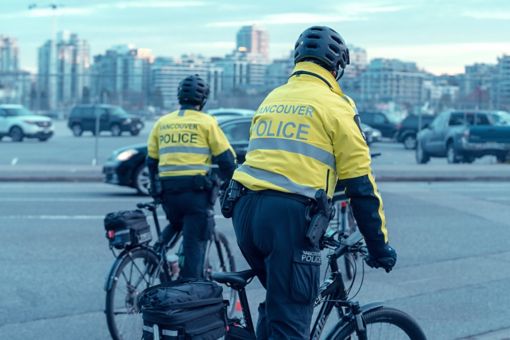The business of public safety can be costly. Police officers are a highly trained resource requiring training programs and compensation, vehicles, kit items and other equipment. Regardless of cost, the priority of community leaders and police services is to meet public safety needs. What makes resource investments and allocations more difficult, however, is that those needs and resources are constantly evolving.
The past few years have brought new kinds of public safety challenges to the fore in cities and rural areas. Canadian citizens expect police presence in their communities, but officers are being pulled in several new directions.
In addition to the routine business of collisions and break-ins, police officers are responding to specialized areas, from human trafficking, to hate crime and cybercrime. They’re assisting with social issues stemming from the rising opioid crisis and housing insecurity. However, as jurisdictions seek additional front-line social supports for vulnerable populations, many are finding that police services are not always the best response to mental health and drug addiction related calls.
Police services are facing their own staffing pressures, too. As we discussed in a related article (Staffing police services: Getting the right mix to meet citizen needs), increases in retirement and mental health leave are impacting the ability of police services to provide adequate capacity.
These new circumstances are inviting a re-think of traditional policing models. At the same time, legislative and technological developments are ushering in new ways of managing the business of public safety. Rather than stretching existing resources too thin or compromising community safety, municipalities are exploring alternative staffing, alternative service delivery, and technology applications for administrative tasks. The best part? The new models not only deploy resources more efficiently, they enhance the services provided.
Exploring tiered enforcement
These shifts in thinking recognize that law enforcement and public safety exist on a spectrum. Not every incident needs to be handled by trained police officers. There’s room for specialized roles for designated individuals, agencies, and technological solutions alongside traditional police officers. Recent and anticipated legislative changes are forging a pathway for added flexibility along these lines.
Many situations can be addressed by designated civilians – special constables, peace officers, or accommodated officers – who have different training and different authorizations. Some municipal contexts, such as transit and university campuses, are already managed by special constables using a “tiered” policing model. Ontario’s Police Act introduced “situation tables,” which team social agencies with policing organizations to develop public safety measures informed by local needs and capacities.
Cybercrime is another area demanding attention. However, standard police training doesn’t delve deeply into this area. A tiered services model can bring great value by leveraging the skill sets of expert civilians.
Many communities are starting to implement tiered or alternative response approaches to incidents involving people in distress. A social worker or crisis expert responds to situations, with or without police officers, depending on the situation (e.g. Alberta’s Police and Crisis Team (PACT) model). Another approach places a mental health professional in the dispatch center, to determine the right resource for every response. When a social worker or a special constable can assist an individual, a police officer isn’t taken away from higher priority tasks while they wait with that individual at a police station, a hospital, or a collision site.
When the training of the responding individual or team is right for the situation, the result is better service and effective use of available resources.
Leveraging alternative staffing and technology
Combined with new technology, the tiered model can also make more efficient use of resources in ways that respond better to citizen needs. When someone experiences a break-in, they feel violated and shaken. Even so, highly trained police officers can do very little to alleviate the victim’s unease or gather investigative evidence. Such incidents can often not be given immediate or lengthy attention. From the citizen’s perspective, that delay or inaction leaves them feeling disrespected and unprotected.
With alternative staffing and service delivery, however, communities can meet citizen expectations while making good use of policing resources. Special constables can take detailed reports by phone, online or on site. Prompt service delivers empathy, demonstrates efficiency, and provides the necessary record-keeping to ensure the incident is registered and tracked.
Collision reporting and criminal record checks are two more areas suited to alternative service delivery. Many jurisdictions are setting up private offices, call centers, and websites to handle these administrative tasks, and improving their Records Management Services (RMS) – with designated civilians in charge.
Better service, better use of resources
Jurisdictions that have embraced alternative service approaches are finding they deliver better public safety and make better use of existing police complements. Given ongoing staffing pressures, evolving safety needs, and new legislative flexibility, these directions are rapidly becoming leading practices for police services across Canada.
Assistance from experienced partners can help police services and municipal councils explore and tailor new policing models to local circumstances. KPMG professional consultants have worked with police services and government bodies across Canada and around the world. We can provide implementation support for tiered response approaches, help design and implement technology solutions, and develop alternative staffing strategies that enhance public safety while managing policing budgets efficiently.
To talk more about alternative policing models and explore strategies and opportunities to meet your community’s public safety needs, contact us at KPMG in Canada.
Insights and resources
Connect with us
Stay up to date with what matters to you
Gain access to personalized content based on your interests by signing up today
Connect with us
- Find office locations kpmg.findOfficeLocations
- kpmg.emailUs
- Social media @ KPMG kpmg.socialMedia





